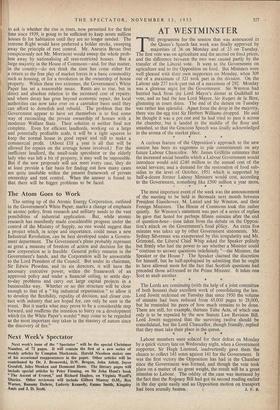AT WESTMINSTER
THE programme for the session that was announced in the Queen's Speech last week was finally approved by majorities of 36 on Monday and of 23 on Tuesday. The first vote was on agriculture and the second on food prices, and the difference between the two was caused partly by the transfer of the Liberal vote. It went to the Government on agriculture and to the Opposition on food. But Ministers were well pleased with their own supporters on Monday, when 309 out of a maximum of 321 took part in the division. On the Labour side 277 took, part out of a maximum of 292. Monday was a glorious night for the Government. Sir Winston had hurried back from the Lord Mayor's dinner at Guildhall to vote, and so had the late Lord Mayor, Sir Rupert de la Bere, glistening in court dress. The end of the debate on Tuesday was rather less splendid. Apart from the drop in the majority, there was the egg that Sir Herbert Williams dropped. He said he thought it was a pot one and he had tried to pass it across the chamber, but it landed in the middle of the floor and smashed, so that the Gracious Speech was finally acknowledged in the aroma of the market place. * * * * A curious feature of the Opposition's approach to the new session has been its eagerness to pile commitment's on any future Labour Chancellor. Mr. James Griffiths estimates that the increased social benefits which a Labour Government would introduce would add £240 million to the annual cost of the social services; and a demand for the restoration of food sub- sidies to the level of October, 1951 which is supported by half-a-dozen former Labour Ministers would cost, according to the Government, something like £500 million a year more.
4 * * 4' The most important event of the week was the announcement of the meeting to be held in Bermuda next month between President Eisenhower, M. Laniel and Sir Winston, and their Foreign Ministers. The House of Commons took this rather quietly. Sir Winston's statement was part of a series of replies he gave that lasted for perhaps fifteen minutes after the end of question-hour—time taken from the debate on the Opposi- tion's attack on the Government's food pOlicy. An extra five minutes was taken up by other Government statements. Mr. Sydney Silverman was exasperated by this irregularity and Mr. Grimond, the Liberal Chief Whip asked the Speaker politely but firmly who had the power to say whether a Minister could "continue to answer questions indefinitely "—the Minister, the Speaker or the House ? The Speaker claimed the discretion for himself, but he half-apologised by admitting that he ought to have allowed more for the fact that Scottish questions had preceded those addressed to the Prime Minister. It takes one Scot to snub another. * * * The Lords are continuing (with the help of a joint committee of both houses) their excellent work of consolidating the law. Lord Jowitt reckoned on Tuesday that since 1950 the volume of statutes had been reduced from 45,000 pages to 28,000, but he 'reminded his peers of how much remains to be done. There are still, for example, thirteen Tithe Acts, of which one only is to be repealed by the new Statute Law Revision Bill. Lord Jowitt suggested that the surviving twelve should be consolidated, but the Lord Chancellor, though friendly, replied that they must take their place in the queue.
* * * * Labour members were solaced for their defeat on Monday by a quick victory late on Wednesday night, when a Government supporter, Sir Hugh Linstead, inadvertently gave them the chance to collect 145 votes against 141 for the Government. It was the first victory the Opposition has had in the Chamber since the Government was formed, and though the vote took place on a matter of no great weight, the result will be a great stimulus to Labour. The oddity of the case was increased by the fact that the Regency Bill had got its second reading earlier in the day quite easily and an Opposition motion on transport
































 Previous page
Previous page